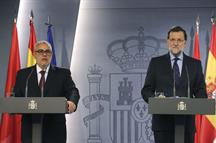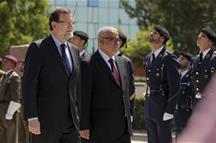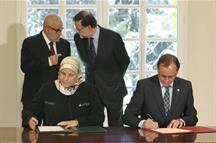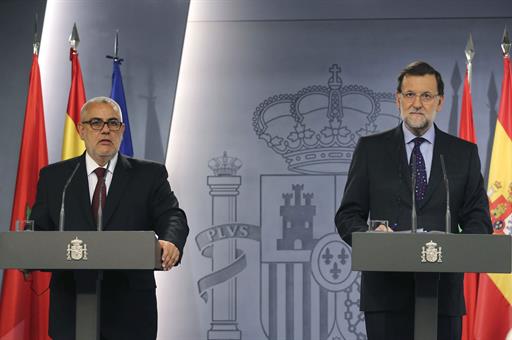Spain and Morocco agree to consolidate their economic and cooperation alliance by signing several agreements
President's News - 2015.6.5
Moncloa Palace, Madrid
The President of the Government, Mariano Rajoy, and the Prime Minister of Morocco, Abdelilah Benkiran, chaired the 11th Spain-Morocco High-Level Meeting at Moncloa Palace. The two leaders reviewed the "effective partnership" that exists between the two countries on justice and home affairs issues, particularly in the fight against terrorism, drug trafficking and illegal immigration, explained the President of the Government.
The two leaders paid special attention to driving trade and investment relations. "Morocco is our main client outside of Europe, behind only the United States, and Spain is Morocco's leading trade partner. In 2014, trade exchanges between the two countries hit almost 10 billion euros and more than 17,000 Spanish companies targeted the Moroccan market for their exports", highlighted Mariano Rajoy.
 Pool EFEMariano Rajoy and Abdelilah Benkiran also analysed how to improve the "privileged relationship" that Morocco has developed with the European Union, with Spain's support. In this regard, Mariano Rajoy recalled that "Morocco receives the greatest financial allocation of any southern neighbour and is also the leading country in terms of negotiating the new model of free trade agreements, as well as in signing a mobility partnership agreement".
Pool EFEMariano Rajoy and Abdelilah Benkiran also analysed how to improve the "privileged relationship" that Morocco has developed with the European Union, with Spain's support. In this regard, Mariano Rajoy recalled that "Morocco receives the greatest financial allocation of any southern neighbour and is also the leading country in terms of negotiating the new model of free trade agreements, as well as in signing a mobility partnership agreement".
They also tackled various issues of international current affairs. In relation to Libya, Mariano Rajoy indicated that they agreed on the need to reach a political and negotiated exit to the conflict. The two leaders support the mediation work being undertaken by the Special Representative of the United Nations Secretary General, the Spaniard Bernardino León.
Mariano Rajoy shared opinions with Abdelilah Benkiran on the migratory crisis in the Mediterranean. "We also spoke about the instability affecting the Sahel and, in particular, about the situation in Mali, where Spain heads up the European mission to train the Malian Armed Forces", highlighted the President of the Government.
Mariano Rajoy asserted that the fight against Jihadi terrorism is a "shared priority" and an area in which the two countries work closely together. "It is a phenomenon that endangers the security of our citizens and threatens the model of democratic co-existence of our societies. It knows no borders and affects North Africa, the Middle East, the Sahel and Europe equally; it affects us all. And, as I have said on various occasions, it does not represent Islam".
Excellent bilateral relations
 Pool EFEThe President of the Spanish Government and his Moroccan counterpart described the bilateral meeting as very beneficial. "We have seen how our bilateral relations are enjoying an excellent period, with constant exchanges and visits that help foster mutual confidence and allow us to quickly and decisively respond to common challenges", said Mariano Rajoy.
Pool EFEThe President of the Spanish Government and his Moroccan counterpart described the bilateral meeting as very beneficial. "We have seen how our bilateral relations are enjoying an excellent period, with constant exchanges and visits that help foster mutual confidence and allow us to quickly and decisively respond to common challenges", said Mariano Rajoy.
In this regard, he recalled that since the two leaders have been heading up the governments of their respective countries, they have managed to recover the annual nature of the high-level meetings and visits. In 2012, they held a High-Level Meeting in Rabat.
Mariano Rajoy added that Morocco has made a major effort over the last few years. "It is an exemplary country which is enjoying significant economic growth, it has been capable of reducing the economic imbalances that so harshly prejudice the well-being of the people, such as the public deficit and the foreign trade deficit, and I am absolutely convinced that by continuing to work together and increase our collaboration we are two countries with a very important future ahead of us", he stated.
Sector meetings
 Pool EFEThe President of the Government reported that within the framework of the High-Level Meeting, various sector meetings were held at which the Spanish and Moroccan Ministers reviewed joint projects and explored new avenues of cooperation.
Pool EFEThe President of the Government reported that within the framework of the High-Level Meeting, various sector meetings were held at which the Spanish and Moroccan Ministers reviewed joint projects and explored new avenues of cooperation.
At the end of the working day, a joint declaration was adopted and a series of agreements were signed on important areas for both countries, such as judicial cooperation, promoting tourism, managing water resources and support for women, small children and the elderly.
In parallel to these meetings, an economic and business forum co-organised by the CEOE [Spanish confederation of business organisations] and its Moroccan equivalent (CGEM) took place in Madrid.
During his stay in Madrid, the President of the Moroccan Government also received an audience from King Felipe VI.
Current affairs
In response to questions regarding meetings recently held with the leaders of Ciudadanos and the PSOE [Spanish Socialist Workers' Party] from journalists at the press briefing, the President of the Government expressed his interest in any agreements being reached over the coming days respecting, as a general rule, the most voted-for party list; "which to me seems to be the most democratic solution", he said.
He also asserted that it is fundamental for stable governments to be formed and for agreements to be based on political realities that contribute to economic recovery and job creation.
In his opinion, they should deal with issues that affect the autonomous regions and local councils: what they are going to do with taxes and how they will allocate their resources.
Along these lines, he indicated that three- or five-party pacts do not tend to work, "but generate problems and difficulties. They are very bad for the general interests of all concerned". He also stated that he feels "very concerned" by the exclusion of the People's Party in the declaration made by the PSOE in terms of making pacts, whilst it is trying to reach an agreement in Andalusia. In this regard, he underlined that "in the 21st Century, both sectarianism and exclusion should be issues that should be set aside, at least by responsible political leaders".
In terms of economic policy, he considered that making changes "would be a folly, a colossal mistake and hugely negative for the interest of the Spanish people". On the contrary, what needs to be done is to persevere, since, after several years of recession, of negative economic growth, of continuous rises in unemployment, now that things are starting to get better, after an enormous effort from Spanish society, "it would be a folly to bring this to a halt", he underlined.
In relation to the issues of migration and human trafficking, the President of the Government declared that "the European Union must make an effort to help all those countries in Sub-Saharan Africa, all those countries where many people come from to make a living", and it must work to ensure "peace, stability and progress", because that "would be good for all African countries, for all European countries and, above all, for many people that have to leave their own country to live a dignified life in another".





